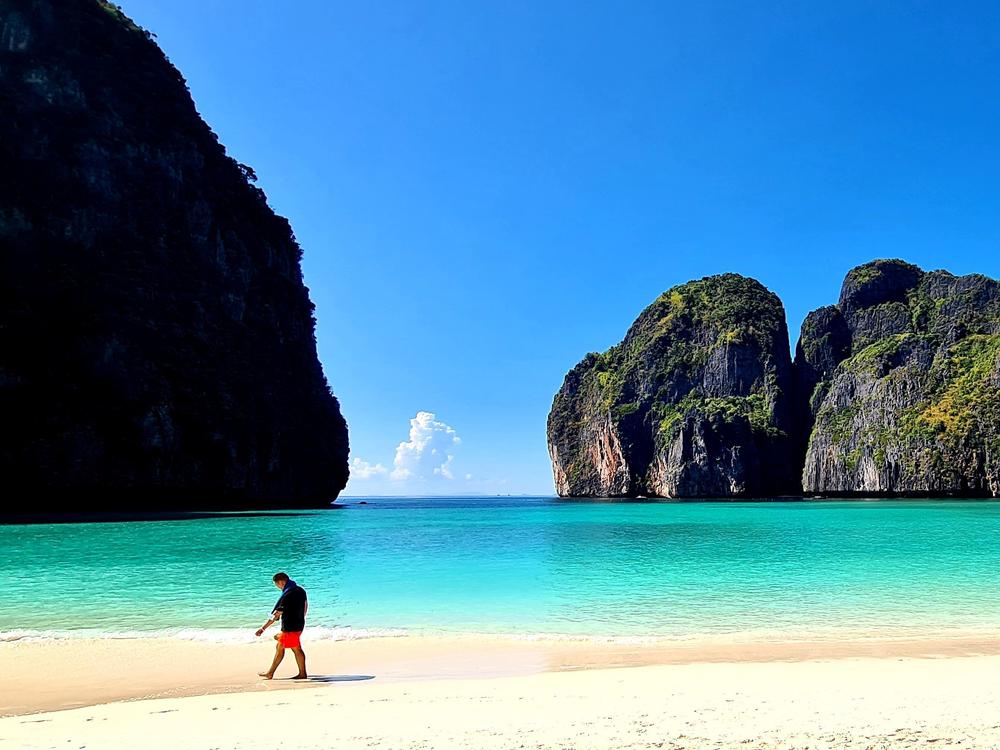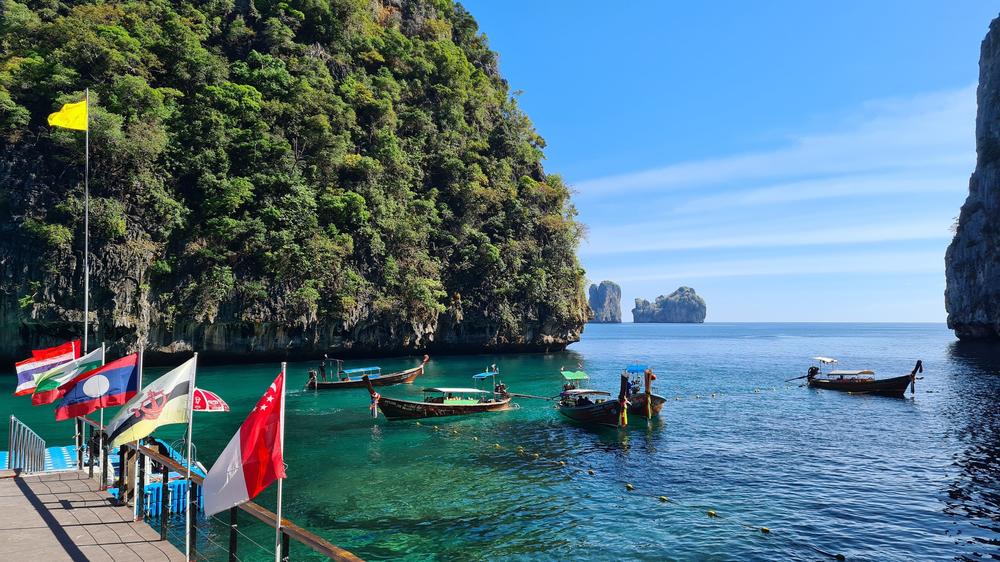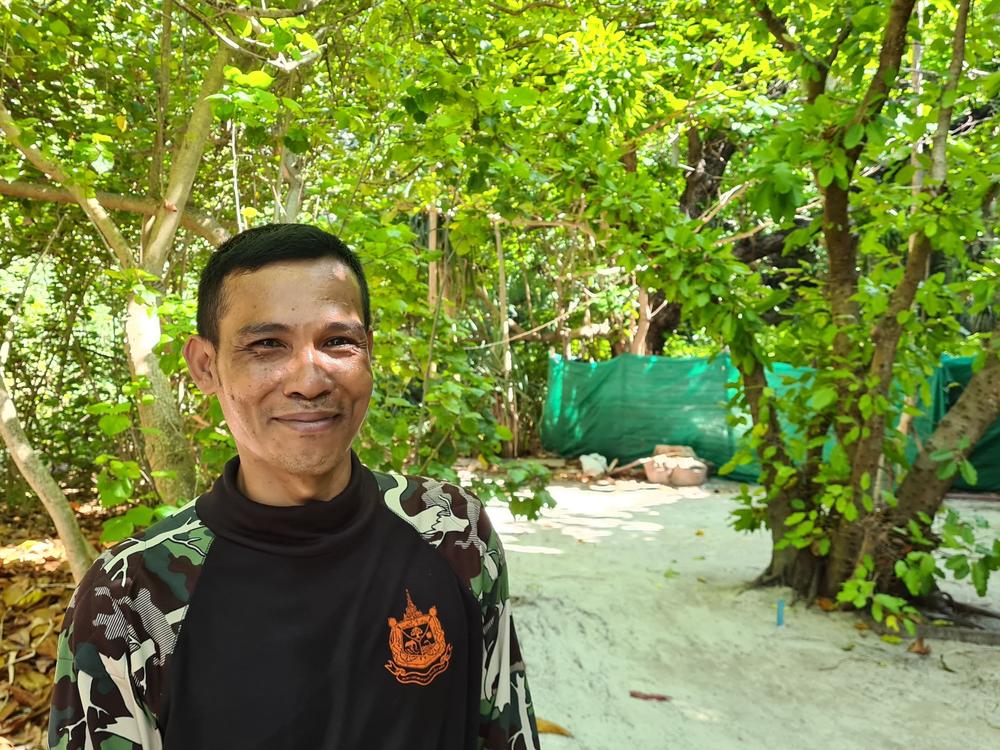Section Branding
Header Content
In Thailand, the pandemic helped a famous beach recover from an onslaught of tourists
Primary Content
The Leonardo DiCaprio film The Beach that came out in 2000 about a fictional island utopia hidden from the outside world helped make Thailand's Maya Bay very popular.
Too popular, it turned out.
By the time I visited eight years later, Maya Bay was still undeniably gorgeous, but also undeniably overrun with tourists and the distinctive longtail boats that brought them — spewing smoke, churning up sediment and dragging their anchors through the coral. Passengers jumped over the side to wade or swim to shore, fouling the water with sunscreen and trash.
Park ranger Suthep Chaikao says that by 2018, things were even worse — with the once pristine bay, the crown jewel of the Hat Noppharat Thara-Mu Ko Phi Phi National Park, hosting upwards of 5,000 visitors per day.
"Back then, I'd wake up at 5 a.m. and there would be boats in the bay already," he says. "The sun wasn't even up yet and they were already here. Back then, they didn't have a proper opening or closing time either, so tourists could come whenever they wanted."
Thai authorities closed the beach
In June of that same year, the Thai government closed Maya Bay because of the devastating impact of mass tourism on the ecosystem. It remained shuttered for nearly four years before reopening in January.
But now there are rules: Advance booking is required. No more than 375 people are allowed at any one time.
No more boats in the bay, either. Instead, there's a purpose-built dock on the other side of the island to drop passengers, who then take a short walk through the jungle to the crescent shaped beach. Tourists can dip their toes in the water for that all important selfie, but nothing more. A dozen or so rangers patrol the beach whistling violators out of the water. They're serious, too.
"Today we gave a French tourist a 5,000 baht fine [$175] for swimming in the bay," Suthep explains. "One of the rangers warned him with his whistle, but when he went in a second time, we had to give him a fine."
In the few weeks Maya Bay has been reopened, Suthep has only had to give out about half a dozen tickets, he says. Thai tour guide Amie Hemthanon says she's surprised and delighted at how her customers have responded.
"I've been talking to them, what we should do, what we should not do and luckily my customers are nice and do what I ask for," she says. "To me, as long as people can follow these rules, it'll be fine."
Blacktip sharks have returned
In the three and a half years since it was closed, Maya Bay's transformation has been amazing, Suthep says. Even the blacktip sharks are breeding here again, he says.
"Back in 2018, before we closed, you couldn't even think about seeing a shark," he says. "You couldn't even see a three-inch fish. Now, on a good day, you can see over 160 sharks. And when the tide goes down, I can see all the new coral and crabs and shrimp. It makes me very proud."
The stunning scenery and sea life are the reason why the tourists have come. But even some of them seem unprepared for what they find.
"I would never have imagined it was so beautiful," says Susanne Wiegratz, who's visiting from Germany. "Gorgeous. Wonderful. I really don't know, probably my English words are not enough for me to [say] this most beautiful spot on Earth that I've ever seen."
A spot that one of her travelling companions had to work very, very hard to reach.
University student Fenna Tobin tested positive for COVID-19 shortly after her arrival in Thailand. She had to spend the next ten days of her vacation in quarantine. This is her second day out.
The obvious question is: was it worth it?
"Yes," she says laughing. "Totally." It's so, so beautiful." She struggles for the words in English—then sighs deeply. "I'm so calm now."
Thai tourist Wararat Phanit-Chakoon is from nearby Hat Yai province.
"I waited for after Maya Bay reopened to come here," she says. "I knew if I had come before, I would not have been happy with it."
She says the water where she lives is nice, too. But not like this. "The water is so beautiful, so green and it's crystal clear."
"It makes me want to swim," she says, "but I understand why I can't. I know they worry about the sunscreen impacting the reef."
"I think they did it right," says Wiegratz, who works in pharmaceuticals, but is a marine biologist by training.
"If you ask me, I would have kept it closed forever to tourists," she says. She's worried about the blacktips. "The little ones that are growing up here, this needs to be protected. Otherwise we are not going to have any sharks anymore — and we don't have many left anyway."
Head ranger Suthep Chaikao is also worried. He hopes the government keeps limiting the number of visitors and doesn't succumb to the temptation of allowing more to help kickstart Thailand's COVID-battered tourism industry. The pandemic saw Thailand close its borders to foreign tourists for almost two years beginning in March 2020.
The pandemic allowed some extra time to bounce back
But that extra time turned out to be a blessing for Maya Bay, says marine biologist Thon Thamrongnawasawat of Bangkok's Kasetsart University. Thon spearheaded the effort to close the bay in 2018 to allow its ecosystem to recover. But he was concerned the original timetable was too short.
"I was very worried two years might not be enough for coral to grow back for the eye to see. But we got four years, and [now] there are a lot of small coral growing," Thon says. "So now we have evidence to show other people if we give mother nature a chance...she can come back. So that four years means a lot more than two years."
He sees no reason why Maya Bay and its ecosystem can't stay healthy, and serve as a more sustainable tourism model for the Phi Phi islands and other nearby destinations which welcomed nearly two million tourists per year before the pandemic.
Copyright 2022 NPR. To see more, visit https://www.npr.org.



